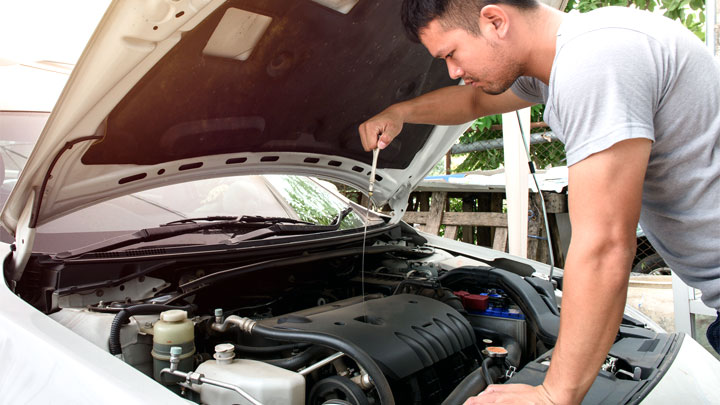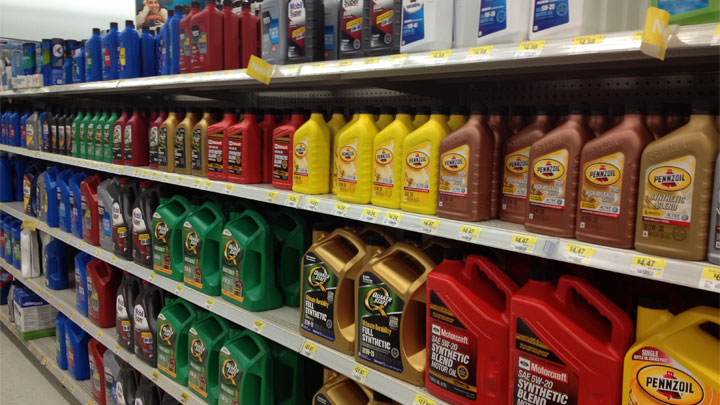Last Updated on October 8, 2021
If you log enough years behind the wheel, you will inevitably find yourself faced with a number of peculiar issues. Why you might not immediately recognize the cause of such puzzling issues, you are likely to understand that something is amiss. Under these circumstances, further investigation is warranted.
One scenario of this nature is that which pertains to the realization that your vehicle’s oil smells of gasoline. While both of these two fluids are essential to engine operation, they should not mix under typical circumstances. Therefore, one is correct to be concerned when gasoline is found anywhere within their engine, other than where it is intended.
In reality, this condition is known as oil dilution and is quite serious in nature. If severe enough, oil dilution can negatively impact lubricant viscosity, ultimately leading to bearing failure. Therefore, it’s essential to diagnose and remedy the root cause of oil dilution, at the first possible opportunity.
Read on to learn more about what it means for your car’s engine oil to smell like fuel, as well as what to do should you be faced with such an issue in the future.
Possible Reasons Your Oil Smells Like Gas
An engine’s oil can become contaminated with gasoline for several reasons, some of which are far more serious than others. The following are several possible reasons for the onset of this condition.
#1 – Faulty Injectors
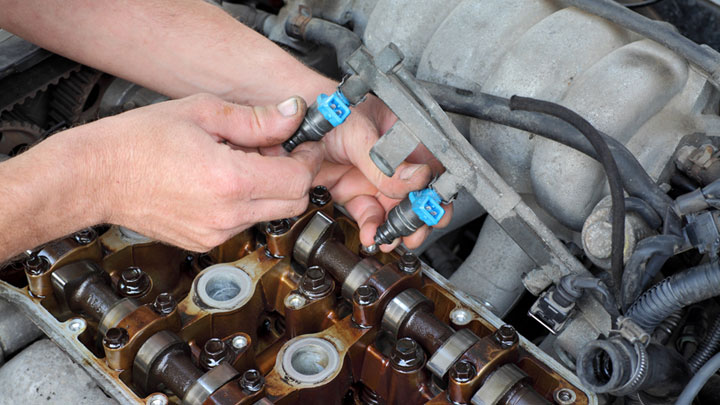
Properly functioning injectors atomize fuel with each pop-off. This atomization allows fuel to burn thoroughly, and in the most efficient manner possible.
However, aging injectors often fail to atomize fuel in the same manner, leading to a less than adequate burn. As a result, unburnt fuel washes past the piston rings of the affected cylinder, eventually mixing with the engine’s lubricating oil.
#2 – Ignition System Issues
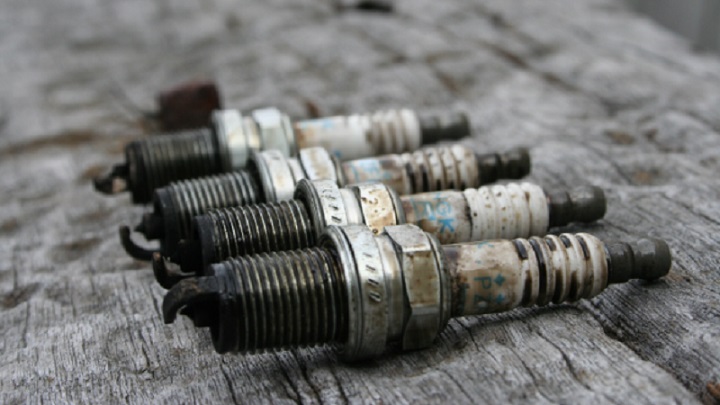
An engine’s ignition system features numerous individual components, all of which work together to ignite the fuel that is delivered into an engine’s cylinders. If any of these components fail (faulty spark plugs for instance), fuel can be left unburnt within one or more cylinders.
In severe cases, this fuel will wash past a cylinder’s piston rings, at which point it will begin mixing with oil found in the sump.
Related: 6 Causes of Oil on Spark Plug Threads
#3 – Overly Rich Air/Fuel Ratio
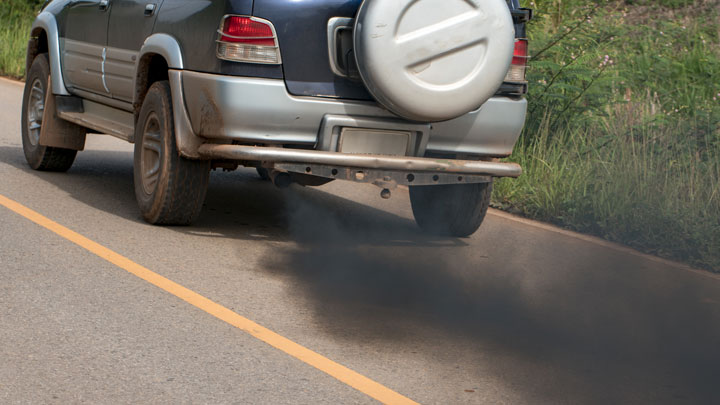
In certain scenarios, one or more faulty sensors can trick an engine’s engine control module into dosing too much fuel for a given situation. This, in turn, creates a “rich” condition, under which an engine is unable to completely burn all fuel that is injected.
As a result, excess fuel is washed past an engine’s cylinder rings, where it ultimately mixes with the oil that awaits below.
#4 – Internal Engine Wear
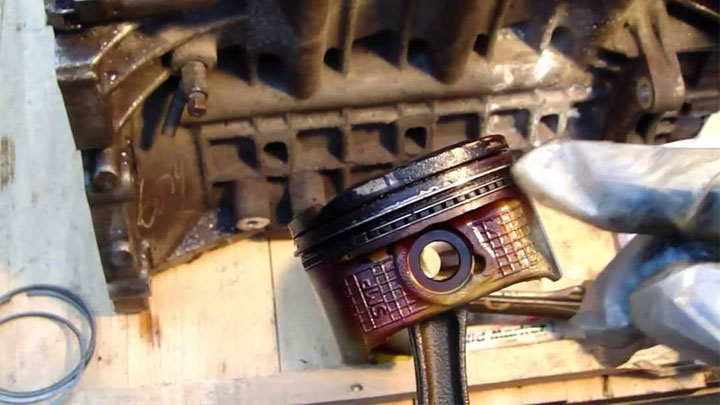
In rare cases, the mixing of oil and gas can come as a result of internal engine wear. When an engine’s cylinder walls or piston rings begin to exhibit excessive wear, proper combustion is impeded.
As a result, a substantial amount of fuel often goes unburnt, washing down an engine’s cylinder walls, and as a result, putting an engine at risk for accelerated bearing wear.
#5 – Infrequent Oil Changes
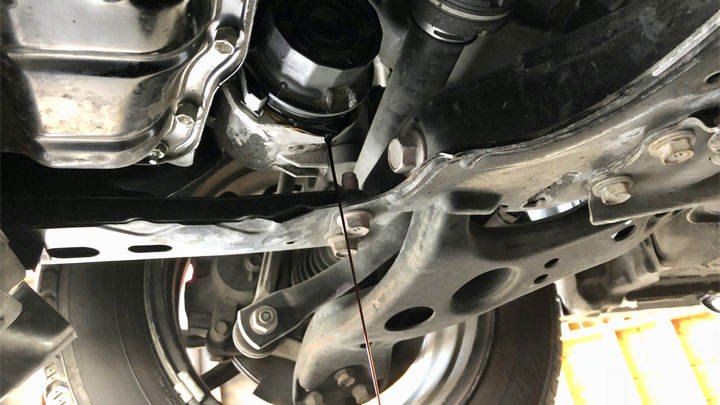
In any event, a small amount of fuel makes its way into an engine’s lubricating oil, even in absence of mechanical issues. This fuel tends to be minimal at the most and poses no true risk to an engine’s longevity.
However, a lack of regular service can cause this fuel to compound, as standard oil change intervals are skipped. Eventual fuel dilution will result, often presenting a gasoline-like odor.
#6 – Frequent Short Distance Travel

Today’s OBD-II driven vehicles are programmed to run rich at startup, eventually transitioning to a somewhat leaner air/fuel ratio as operating temperatures rise. This ensures that adequate fuel is delivered during cold operation, thereby preventing stalling and poor performance.
However, this excess fuel can eventually lead to oil dilution, if few long-distance drives are ever taken.
Is Gasoline in Oil Visible?
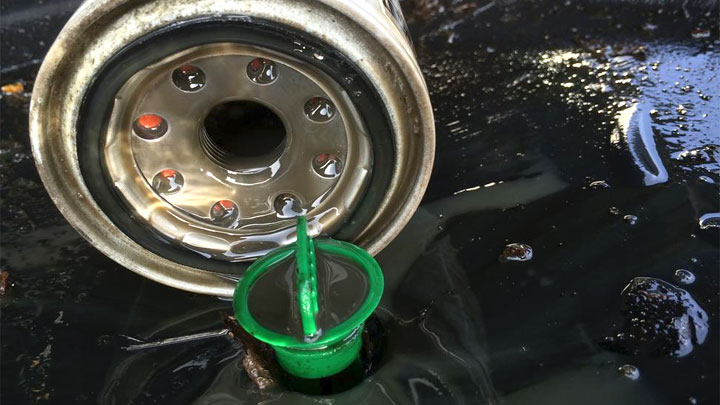
Gasoline is not always visible when mixed with engine oil. In fact, contamination of this type is far more likely to appear as a noticeable thinning of oil. This “thinning” makes motor oil appear far more translucent than it would be otherwise.
Gasoline contaminated oil will also tend to feel quite thin to the touch. This is most evident when rubbing a small amount of contaminated oil between your thumb and index fingers. This represents a relative loss in viscosity, which can accelerate bearing wear.
Is It Safe to Drive If You Smell Gas in Your Engine Oil?

In general, driving a vehicle with a detectable amount of gas in the engine oil is not advisable. Doing so poses a significant risk to engine integrity, as gas can thin oil, thereby reducing its viscosity. As such, wear to critical components, such as an engine’s bearings, can be accelerated.
This, of course, is not to say that driving with fuel diluted oil will cause instantaneous engine failure. However, doing so poses a substantial risk, and is likely to do harm, even if such harm is not immediately evident. Therefore, it is best to avoid driving a vehicle that’s oil carries a gasoline odor.
If the affected vehicle must be driven, several precautions should be taken. First, the engine’s oil and oil filter should be changed. In doing so, an oil sample can be taken for analysis. This sample can be sent off for laboratory testing, thereby confirming any suspensions of oil dilution you might have.
In any event, the root cause of an engine’s oil dilution issues should be diagnosed and remedied at the first available opportunity. Doing so minimizes the chance of secondary issues, any of which might result from operating a vehicle in absence of pure, non-diluted oil.
If you do not feel confident tackling such repairs yourself, it is important to make an appointment with your service center of choice, as soon as possible.

